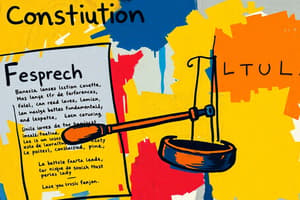Podcast
Questions and Answers
Quin és el principi fonamental de la Constitució espanyola?
Quin és el principi fonamental de la Constitució espanyola?
- La divisió de poders
- La sobirania del poble
- La llibertat d'expressió
- La igualtat davant la llei (correct)
Quin és el dret dels ciutadans espanyols?
Quin és el dret dels ciutadans espanyols?
- Votar en les eleccions
- Anar a l'escola gratuït
- Participar en el govern
- Defensar Espanya (correct)
Quin és el límit del dret a la propietat privada?
Quin és el límit del dret a la propietat privada?
- La Constitució
- La funció social (correct)
- La llei
- El govern
Quin és el principi bàsic de la Constitució espanyola?
Quin és el principi bàsic de la Constitució espanyola?
Quin és el dret dels ciutadans espanyols a la Constitució?
Quin és el dret dels ciutadans espanyols a la Constitució?
Quin és l'objectiu de la Constitució espanyola?
Quin és l'objectiu de la Constitució espanyola?
Quin és el principi polític que defensa Espanya segons la Constitució?
Quin és el principi polític que defensa Espanya segons la Constitució?
Quin és l'òrgan que té l'autoritat final en cas de dubte sobre la línia entre la Constitució espanyola i un Estatut d'Autonomia?
Quin és l'òrgan que té l'autoritat final en cas de dubte sobre la línia entre la Constitució espanyola i un Estatut d'Autonomia?
Quin és el principi que regeix la contribució dels ciutadans a les despeses públiques?
Quin és el principi que regeix la contribució dels ciutadans a les despeses públiques?
Quin és l'objectiu del Govern espanyol en relació amb els treballadors espanyols a l'estranger?
Quin és l'objectiu del Govern espanyol en relació amb els treballadors espanyols a l'estranger?
Quin és el document que estableix les competències d'una regió autònoma?
Quin és el document que estableix les competències d'una regió autònoma?
Quin és l'objectiu del sistema tributari espanyol?
Quin és l'objectiu del sistema tributari espanyol?
Flashcards are hidden until you start studying
Study Notes
Spanish Constitution: First Title
The Spanish Constitution, established in 1978, is the fundamental legal framework of Spain. It outlines the country's political, economic, and social structure, and is divided into eleven titles, each focusing on various aspects of governance. This article will delve into the first title, which covers the principles of political organization, fundamental rights, rights and duties of citizens, economy and finance, and territorial organization.
Fundamental Rights
The Spanish Constitution recognizes the right to life and physical and moral integrity, with no form of torture, inhumane or degrading punishment, or capital punishment allowed. All Spaniards are equal before the law and cannot be discriminated against based on birth, race, sex, religion, or opinion. The right to individual and collective petition is granted, with some exceptions for members of the Armed Forces or institutions subject to military discipline.
Rights and Duties of Citizens
Citizens have the duty to defend Spain, and the law determines the military obligations and conscientious objection, as well as other grounds for exemption from compulsory military service. The right to private property and inheritance is recognized, with the social function of these rights determining their limits in accordance with the law.
Principles of Political Organization
Spain is established as a social and democratic state, subject to the rule of law, advocating liberty, justice, equality, and political pluralism. The Constitution is based on the indissoluble unity of the Spanish Nation, recognizing the right to autonomy of the nationalities and regions of which it is composed. The political form is a parliamentary monarchy, with the Cortes Generales (Congress of Deputies and the Senate) passing and ratifying the Constitution.
Territorial Organization
The Constitution recognizes the right to self-government of the nationalities and regions, and the solidarity amongst them all. Each region has its own Estatuto de Autonomía (statute of autonomy), which must be approved by a Ley Orgánica (organic law) from the central Spanish Parliament. The Tribunal Constitucional is the final authority in case of uncertainty as to where the line between the Spanish Constitution and an Estatuto de Autonomía should be drawn.
Economy and Finance
All Spaniards are required to contribute to sustain public expenditure according to their economic capacity through a fair tax system based on the principles of equality and progressive taxation. The law establishes rights and duties in the event of serious risk, catastrophe, or public calamity. The State is concerned with safeguarding the economic and social rights of Spanish workers abroad, and directs its policy towards their return.
In conclusion, the first title of the Spanish Constitution outlines the fundamental rights, duties of citizens, principles of political organization, territorial organization, and economy and finance. These principles form the backbone of the Spanish legal system, ensuring justice, liberty, security, and well-being for all citizens.
Studying That Suits You
Use AI to generate personalized quizzes and flashcards to suit your learning preferences.




